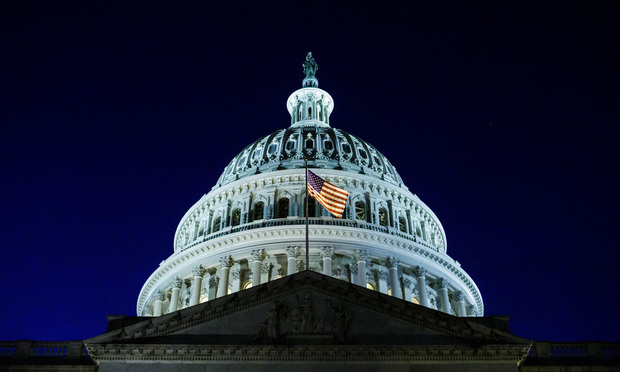Are Recent Stock Sales by Members of Congress the Tip of the Insider Trading Iceberg?
In these times of market volatility, the need for prudence is greater than ever.
April 17, 2020 at 03:00 PM
6 minute read
 The U.S. Capitol building in Washington, D.C., on Thursday, December 12, 2019.
The U.S. Capitol building in Washington, D.C., on Thursday, December 12, 2019.
Imagine the temptation: You are present at a highly confidential briefing where you learn that a developing pandemic is likely to wreak havoc on the American economy. What do you do? What can you do?
As we have seen from recent press reports, this is not just a theoretical question, as it appears that certain members of Congress sold stock after attending a series of confidential congressional briefings around the threat of the novel coronavirus beginning in late January, before the stock market plummeted. But in these times of market volatility, a similar situation could take place in different ways at many different companies.
Ultimately, what is the message for executives at public companies? The need for prudence is greatest when the temptation is highest.
The STOCK Act
Congress passed the Stop Trading on Congressional Knowledge (STOCK) Act in 2012. The act states that a member or employee of Congress "may not use nonpublic information derived from such person's position as a Member of Congress or employee of Congress or gained from the performance of such person's official responsibilities as a means for making a private profit." The STOCK Act essentially specifically renders members of Congress (and other federal officials) subject to existing insider trading laws.
The STOCK Act is based on the misappropriation theory of insider trading, first adopted by the Supreme Court in the 1997 decision of United States v. O'Hagan. This theory basically provides that a trader can be liable for insider trading if she obtains material nonpublic information from a source to which she owes a duty of trust and confidence, and then trades.
The act expressly codifies the duty that each member and employee of Congress owes and to whom. Under the act, each member or employee of Congress owes a duty arising from a relationship of trust and confidence to the Congress, the United States government and the citizens of the United States with respect to material, nonpublic information derived from such person's position as a member of Congress or employee of Congress or gained from the performance of such person's official responsibilities.
The specific members of Congress who apparently sold stock after attending the confidential congressional briefings have put forth various explanations of their trading behavior. Those explanations raise issues that are common in insider trading cases.
I Didn't Use Confidential Info
Defendants in insider trading cases often argue that they didn't use the confidential information they received when placing their trades. This explanation raises the "use versus possession" debate. The argument basically says that there was enough information in the marketplace on which a reasonable person could base a trading decision, so the trader did not need to "use" the information learned at the briefing, even if it was material.
One problem with this explanation is that it is difficult, if not impossible, to compartmentalize the information in one's brain. As judges are fond of saying, "You can't unring the bell." There is also the factual problem brought about by the sequence of events. Yes, the trader may have known that trouble was brewing, but she didn't sell until after the confidential briefing. Under those circumstances, it becomes difficult to say that the confidential information did not motivate the trade.
Nothing Material Was Said
The argument that nothing was said at the confidential briefing that was both nonpublic and sufficiently material, in and of itself, to motivate the trade is often made. The response to this argument is that a reasonable trader would certainly be interested in any of the information conveyed at the confidential briefing, even if the briefing only confirmed facts that were publicly available.
Indeed, even the fact that the briefing took place could support the materiality prong. The simple fact that the trades were placed after the briefing could also belie the defense that nothing material was said there.
My Investment Adviser Did It
Some recent traders have said that they did nothing wrong because they have an investment adviser with discretionary authority who did the trading. If there was absolutely no contact between the trader and investment adviser, then this may be a good defense. But if there was any contact, perhaps through an intermediary (such as a spouse), then this defense could break down. Also, because the STOCK Act expands the duty of trust and confidence to include the public, does this equate to an affirmative duty to refrain from trading at all under these circumstances?
Why Take the Risk?
As companies navigate this turbulent period, they will likely try to gather information in real time and update executives in a timely manner. While these updates may be necessary to the survival of the companies, they may also contain material nonpublic information. This information may provide a motivation to trade.
If a regulator or government agency becomes aware of this trading activity, they will likely investigate. Even if the trading is perfectly appropriate, the investigation will likely be intense and any explanations met with skepticism. Even if someone is ultimately exonerated, substantial legal fees may be incurred, a company's reputation could be negatively impacted, and the stress level will be high.
If an individual is feeling the impulse to trade after receiving any information of a confidential nature, the best course of action is to pause and ask oneself what is motivating the trade. As the saying goes, if you have to ask the question, you probably already know the answer.
Ivan Knauer is a partner at Snell & Wilmer, focusing on securities litigation and enforcement. Matthew Lalli is a partner and the litigation practice group leader at the firm. And Tanya Lewis is an attorney at the firm, focusing on commercial litigation.
This content has been archived. It is available through our partners, LexisNexis® and Bloomberg Law.
To view this content, please continue to their sites.
Not a Lexis Subscriber?
Subscribe Now
Not a Bloomberg Law Subscriber?
Subscribe Now
NOT FOR REPRINT
© 2025 ALM Global, LLC, All Rights Reserved. Request academic re-use from www.copyright.com. All other uses, submit a request to [email protected]. For more information visit Asset & Logo Licensing.
You Might Like
View All
Skadden and Steptoe, Defending Amex GBT, Blasts Biden DOJ's Antitrust Lawsuit Over Merger Proposal
4 minute read
'Lack of Independence' or 'Tethered to the Law'? Witnesses Speak on Bondi
4 minute read
Law Firms Mentioned
Trending Stories
Who Got The Work
J. Brugh Lower of Gibbons has entered an appearance for industrial equipment supplier Devco Corporation in a pending trademark infringement lawsuit. The suit, accusing the defendant of selling knock-off Graco products, was filed Dec. 18 in New Jersey District Court by Rivkin Radler on behalf of Graco Inc. and Graco Minnesota. The case, assigned to U.S. District Judge Zahid N. Quraishi, is 3:24-cv-11294, Graco Inc. et al v. Devco Corporation.
Who Got The Work
Rebecca Maller-Stein and Kent A. Yalowitz of Arnold & Porter Kaye Scholer have entered their appearances for Hanaco Venture Capital and its executives, Lior Prosor and David Frankel, in a pending securities lawsuit. The action, filed on Dec. 24 in New York Southern District Court by Zell, Aron & Co. on behalf of Goldeneye Advisors, accuses the defendants of negligently and fraudulently managing the plaintiff's $1 million investment. The case, assigned to U.S. District Judge Vernon S. Broderick, is 1:24-cv-09918, Goldeneye Advisors, LLC v. Hanaco Venture Capital, Ltd. et al.
Who Got The Work
Attorneys from A&O Shearman has stepped in as defense counsel for Toronto-Dominion Bank and other defendants in a pending securities class action. The suit, filed Dec. 11 in New York Southern District Court by Bleichmar Fonti & Auld, accuses the defendants of concealing the bank's 'pervasive' deficiencies in regards to its compliance with the Bank Secrecy Act and the quality of its anti-money laundering controls. The case, assigned to U.S. District Judge Arun Subramanian, is 1:24-cv-09445, Gonzalez v. The Toronto-Dominion Bank et al.
Who Got The Work
Crown Castle International, a Pennsylvania company providing shared communications infrastructure, has turned to Luke D. Wolf of Gordon Rees Scully Mansukhani to fend off a pending breach-of-contract lawsuit. The court action, filed Nov. 25 in Michigan Eastern District Court by Hooper Hathaway PC on behalf of The Town Residences LLC, accuses Crown Castle of failing to transfer approximately $30,000 in utility payments from T-Mobile in breach of a roof-top lease and assignment agreement. The case, assigned to U.S. District Judge Susan K. Declercq, is 2:24-cv-13131, The Town Residences LLC v. T-Mobile US, Inc. et al.
Who Got The Work
Wilfred P. Coronato and Daniel M. Schwartz of McCarter & English have stepped in as defense counsel to Electrolux Home Products Inc. in a pending product liability lawsuit. The court action, filed Nov. 26 in New York Eastern District Court by Poulos Lopiccolo PC and Nagel Rice LLP on behalf of David Stern, alleges that the defendant's refrigerators’ drawers and shelving repeatedly break and fall apart within months after purchase. The case, assigned to U.S. District Judge Joan M. Azrack, is 2:24-cv-08204, Stern v. Electrolux Home Products, Inc.











